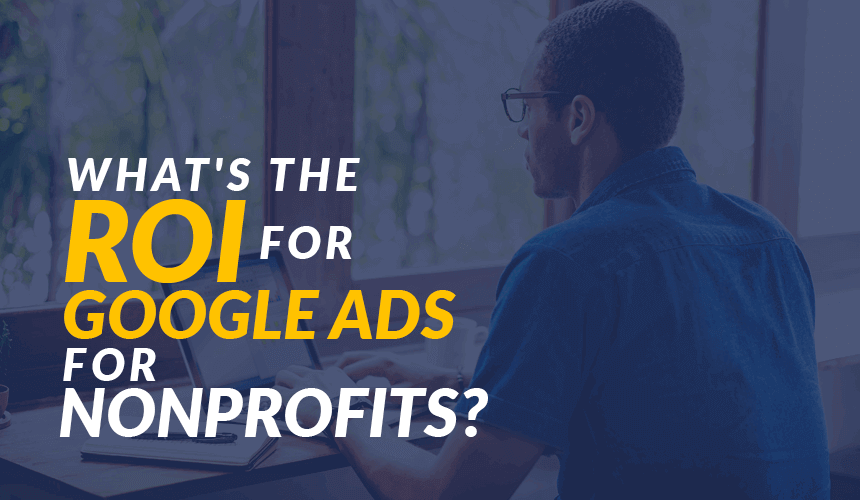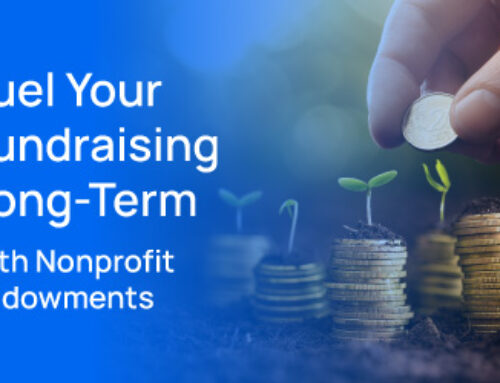
One of the best nonprofit tools out there is the Google Ad Grant. This monthly grant of $10,000 in ad spending allows mission-based organizations to increase their online visibility and share their cause.
When leveraging any fundraising or marketing tool, you want to make sure that resource has a high return on investment (ROI). That conveys it’s making an impact and is worth the invested time, energy, and money you’ve put into it.
Particularly for Google Grant program participants, it’s important to know the typical ROI for Google Ads so they know what to expect. To help you make the most of the opportunity, we’ll cover these key questions about Google Ad ROI for nonprofits:
- What is ROI?
- What Impacts the ROI of Google Ads for Nonprofits?
- How Do You Calculate Your Nonprofit’s Google Ad Grant ROI?
- When Can I Expect to See Results from Google Ads?
Once you know the basics of Google Ad ROI, you’ll be better equipped to manage your Google Ad Grant account. Let’s get started by answering some common questions.
What Is ROI?
ROI stands for return on investment. It’s a function of how much you have earned from your Google Ads against how much you’ve spent.
For nonprofits, this figure can be in terms of money or donations, but it doesn’t have to be. Take a look at some examples of the types of conversions you may track:
- Donations
- Volunteer registrations
- Event sign-ups
- Newsletter sign-ups
The conversions you track should be entirely based on your marketing goals. For example, if your organization is hosting a charity 5K, consider creating a campaign aimed at getting people to sign up for the event. Then, you would track event sign-ups to measure the ad’s success.
As a Google Ad Grant program participant, you’ll want to make sure you’re putting this valuable opportunity to good use. Measuring ROI helps you to track your campaign’s progress and understand the impact of your ads.
What Impacts the ROI of Google Ads for Nonprofits?
According to Double the Donation, search ads like Google Ads have the highest average ROI for nonprofits using paid advertising at $4.78. This statistic illustrates just how impactful Google Ads can be.
Better yet, since Google is providing the grant, there’s no money coming out of your marketing budget. As a result, you can bid on more expensive keywords without affecting your campaign’s ROI, which wouldn’t be the case in regular paid search campaigns.
Since the Google Ad Grant itself is free, your investment is in grant management costs, whether that’s time, energy, or actual money. Knowing that they won’t have to invest any money in the ads themselves, many organizations opt for using a Google Grants agency.
Hiring a Google Grant agency typically costs between $500 and $1,000 per month. With the help of your team, you can decide how much you’re willing to spend to maximize your ROI and select an agency to work with.
How Do You Calculate Your Nonprofit’s Google Ad Grant ROI?
The simple answer to this question is that you calculate ROI by dividing your return, or the benefits of your investment, by the cost of Google Grant management. However, it can be more difficult to calculate ROI for marketing efforts because there might not be a clear dollar amount to attach to your results.
As mentioned, the conversions you track will depend on your marketing goals. You can track conversions for these goals using Google Analytics. Getting Attention’s Google Ad Grant impact guide mentions there are two main types of goals you may consider:
- Monetary goals such as donations, merchandise sales, and event registrations (if there’s a fee attached).
- Non-monetary goals such as volunteer registrations, newsletter sign-ups, click-through rate, and time spent on site.
Again, it’s much easier to calculate ROI for monetary goals. All you have to do is divide the money you earn from your Google Ad campaigns by the amount you dedicate to Google Ad Grant management.
While determining ROI is more difficult for non-monetary goals, it’s not impossible. You can talk to your team about how many conversions you’d like to see for these types of campaigns. That way, you can still assign a value to your conversions, allowing you to calculate ROI.
When Can I Expect to See Results from Google Ads?
Understandably, you’ll want to see results as quickly as possible once you set up your Google Ad campaigns. However, it may take some time for Google Analytics to accumulate the necessary data, so you’ll have to be patient.
You’ll likely start seeing some initial results within the first couple of weeks following campaign creation. When you log into Google Analytics, you should start seeing some clicks for your campaigns.
While clicks will start popping up, you might not see conversions yet, and that’s okay. It can take some time for Google to fully learn your audience and serve your ads to potential supporters.
All campaigns are different, but in general, it usually takes Google Ad Grant campaigns around three months to mature and up to a year to fully strengthen. Again, patience is key because positive results take some time.
While there’s typically a beginning lull in Google Ad Grant campaign results, some additional factors may also slow them down. These may include:
- Having little to no experience with Google Ads. Google provides some recommended settings, but working with a Google Ad Grant agency can help maximize your ROI.
- Entertaining a very specific niche. If fewer people are searching for your cause, it may take longer to see results for your campaigns.
- Creating a brand new website. If all of your content is new, you probably have very little performance data for your website. This can make knowing which pages to promote in your ads difficult.
- Promoting a poorly designed website. You may very well have campaigns with strong potential, but if you’re linking to content that’s outdated, irrelevant, or difficult to navigate, you won’t get the results you’re hoping for. Check out Google’s website requirements for the program, and optimize your landing pages accordingly.
Working with a Google Ad Grant agency can help you tackle some of these challenges. In turn, you can drive quicker, better campaign results that boost your account’s ROI.
The Bottom Line
The Google Ad Grant is an extremely valuable marketing and fundraising tool for nonprofits. When using this resource, you’ll want to track your campaign results to make sure you have a high ROI. As you now know, that means your campaigns are performing well and have a significant impact on your operations.
Maximizing ROI can be difficult on your own. Experiment with your campaigns to see what resonates with your audience. You can always get things up and running and then enlist the help of a Google Ad Grant manager if you’re not seeing the results you’d like to. With an expert’s help, you can increase your ROI and make the most of your Google Ad Grant.
About the Author
 Mathew’s expertise is in sales forecasting, goal setting, client growth initiatives and business development and analytics. When he is not laser-focused on moving organizations forward, you can find him spending time with his wife, Lauren, and two dogs, Reagan and Teddy, running marathons and watching the Atlanta Braves and Auburn sports.
Mathew’s expertise is in sales forecasting, goal setting, client growth initiatives and business development and analytics. When he is not laser-focused on moving organizations forward, you can find him spending time with his wife, Lauren, and two dogs, Reagan and Teddy, running marathons and watching the Atlanta Braves and Auburn sports.





